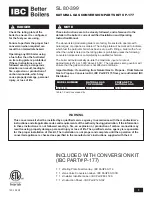
57
Installation & Operation Manual
11
Maintenance
(continued)
The boiler contains ceramic fiber materials.
Use care when handling these materials per
instructions on this page. Failure to comply
could result in severe personal injury.
WARNING
Cleaning boiler heat exchanger
1. Shut down boiler:
• Follow the “To Turn Off Gas to Appliance” instructions
for the boiler in Section 9 - Startup.
• Do not drain the boiler unless it will be exposed to
freezing temperatures. If using freeze prevention fluid
in system, do not drain.
2. Allow time for the boiler to cool to room temperature if it
has been firing.
3. Remove the top access panel to remove the gas/air manifold
assembly.
4. Remove the nuts securing the burner to the burner
mounting plate. Remove the burner (FIG. 11-2).
5. Remove the nuts securing the burner mounting plate from
the heat exchanger and set aside. Remove the entire burner
mounting plate assembly.
6. Use a vacuum cleaner to remove any accumulation on the
tube sheet surfaces. Do not use any solvent.
7. Brush the heat exchanger (tube sheet, combustion chamber
walls, and tube entry) while dry using a nylon bristle brush.
Caution:
DO NOT use a metal brush. Re-vacuum the heat
exchanger.
8. Finish cleaning using a clean cloth dampened with warm
water.
9. Temporarily remove the condensate drain line from the
condensate trap and route directly to a drain.
10. Rinse out debris with a low pressure water supply. The
water will drain through the condensate connection.
11. Allow the heat exchanger to thoroughly dry.
12. Reconnect the condensate drain line to the condensate trap.
13. Close isolation valves on piping to isolate boiler from
system. Attach a hose to the boiler drain and flush boiler
thoroughly with clean water by using purging valves to
allow water to flow through the water make-up line to the
boiler.
14. When securing the burner, be sure to tighten the nuts as
instructed in the “Check Burner Flame” section on page 56
of this manual.
Handling ceramic fiber materials
REMOVAL OF COMBUSTION CHAMBER
LINING
The combustion chamber insulation in this
appliance contains ceramic fiber material.
Ceramic fibers can be converted to cristobalite
in very high temperature applications. The
International Agency for Research on Cancer
(IARC) has concluded, “Crystalline silica in the
form of quartz or cristobalite from occupational
sources is carcinogenic to humans (Group 1).”
Normal operating temperatures in this appliance
are below the level to convert ceramic fibers to
cristobalite. Abnormal operating conditions
would have to be created to convert the ceramic
fibers in this appliance to cristobalite.
The ceramic fiber material used in this appliance
is an irritant; when handling or replacing the
ceramic materials it is advisable that the installer
follow these safety guidelines.
Avoid breathing dust and contact with skin
and eyes.
• Use NIOSH certified dust respirator (N95).
This type of respirator is based on the OSHA
requirements for cristobalite at the
time this document was written.
Other types of respirators may
be needed depending on the job
site conditions. Current NIOSH
recommendations can be found on
the NIOSH website at http://
w w w . c d c . g o v / n i o s h / h o m e p a g e .
html. NIOSH approved respirators,
manufacturers, and phone numbers are
also listed on this website.
• Wear long-sleeved, loose fitting clothing,
gloves, and eye protection.
Apply enough water to the combustion
chamber lining to prevent airborne dust.
Remove the combustion chamber lining
from the boiler and place it in a plastic bag
for disposal.
Wash potentially contaminated clothes
separately from other clothing. Rinse
clothes washer thoroughly.
NIOSH stated First Aid.
Eye: Irrigate immediately.
Breathing: Fresh air.
WARNING
15. Replace the burner mounting plate assembly and gas/air
manifold assembly. Ensure gaskets are in good condition
and positioned properly. Restore boiler to operation.
16. Perform start-up and check-out procedures in the Check
Flame and Combustion - Section 9 - Startup on pages 42
and 44 of this manual.
Review with owner
1. Review the Crest User’s Information Manual with the
owner.
2. Emphasize the need to perform the maintenance schedule
specified in the Crest User’s Information Manual (and in
this manual as well).
3. Remind the owner of the need to call a licensed contractor
should the boiler or system exhibit any unusual behavior.
4. Remind the owner to follow the proper shutdown procedure
and to schedule an annual start-up at the beginning of the
next heating season.








































